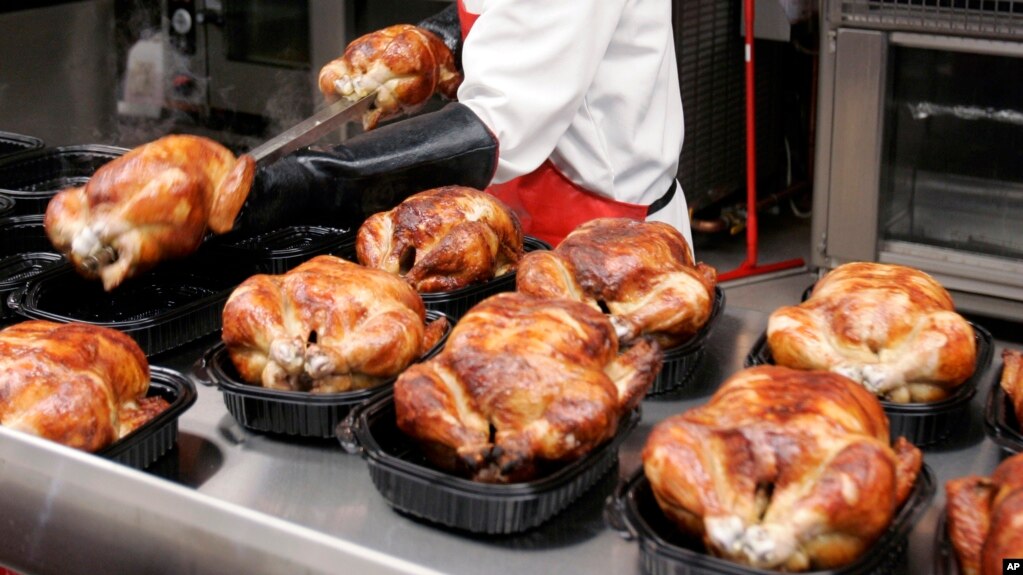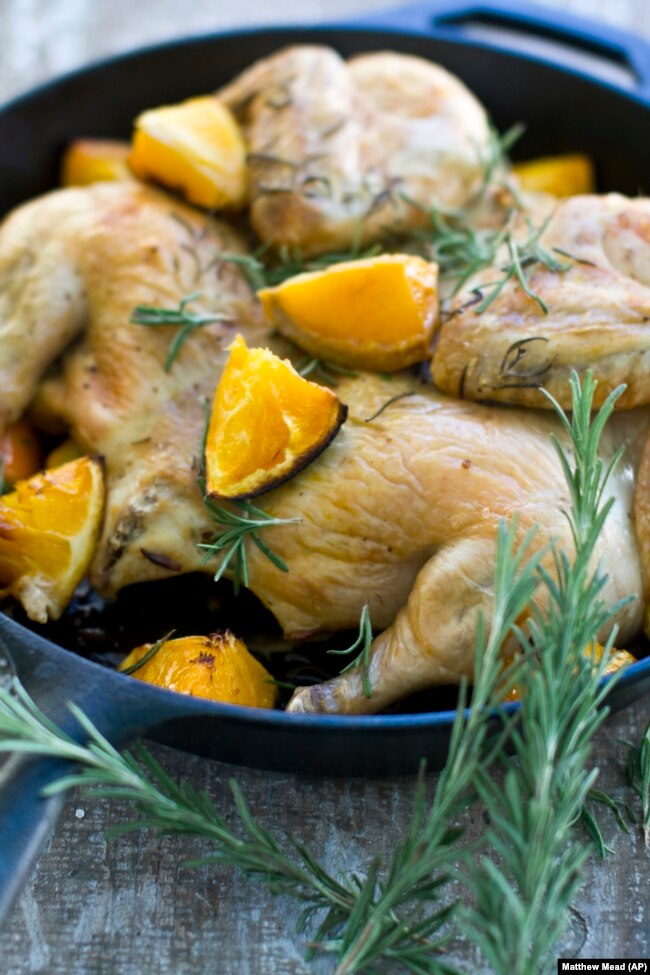The shiny look of a glazed, roasted chicken may look delicious. But it can be difficult to achieve.
The sugar in the glaze caramelizes in the oven. To caramelize food is to heat the sugar in it at a high temperature. This removes all the water. The sugar breaks down and then reforms. The taste it produces is more complex — both sweet and salty, buttery and nutty.
Caramelizing also adds a deeper brown color to the food, in this case the chicken skin. That is, if the sugary glaze stays on.

FILE – In this May 8, 2008, file photo, a butcher spreads out rotisserie-roasted chicken at Costco in Mountain View, California. (AP Photo/Paul Sakuma, File)
Roasting in the oven at a high temperature means the glaze could burn. Or it could come off the chicken and into the pan. This does not lead to a caramelized chicken, but rather just a really dirty container.
A cooking expert, Christopher Kimball, wrote a story for the Associated Press about a well-tested method that keeps the glaze on the chicken. The solution, he says, is in the preparation of the chicken.
Kimball and his team of food experts found that cutting the chicken open and removing its backbone worked best. You can then open the bird and lay it flat in your roasting pan.
The chicken cooks and browns evenly. And because the chicken is flat, the glaze stays where it belongs – on the chicken.

Cooks calls this preparation method spatchcocking. It is also known as butterflying because the bird’s shape looks like a butterfly.
Kimball’s recipe for this simple glaze uses few ingredients. He adds some citrus juice to the glaze in a separate container to use later when the chicken is done.
This dish takes about 1 hour and 20 minutes to make. However, only 20 minutes are actual cooking time. While the chicken is in the oven, you can prepare any side dishes for the meal. Since your oven is already on, you could easily roast some potatoes and seasonal vegetables at the same time.
Chutney-glazed spatchcocked chicken
Here are the ingredients:
- 118 mL (½ cup) tamarind chutney OR mango chutney
- 59 mL (4 tablespoons) melted salted butter
- 5 mL (4 grams or 1 teaspoon) ground turmeric OR ground ginger
- Juice of 1 lemon OR 1 lime
- 1 whole chicken
- Salt and black pepper
Here are the cooking directions:
- Heat the oven to 218°C (425°F).
- Make the glaze. Stir together the chutney, butter, and turmeric. Measure 79 milliliters (⅓ cup) into a small bowl and add the citrus juice. Set this aside. You will use this later.
- Cut out the chicken’s backbone. (Keep this to make chicken soup or chicken stock another time.)
- Place the bird skin side up flat in a roasting pan.
- Season with salt and pepper. Then put on half of the chutney mixture.
- Roast for 40 minutes. Then put on the rest of the chutney mixture and roast until the thickest part of the bird reaches 79°C (175°F.) This will be about another 10 to 15 minutes.
- Take the chicken out of the oven and let it rest in the pan for about 10 minutes.
- Finally, cut, serve with the sauce, and enjoy with family and friends! This recipe serves about four to six people.
I’m Anna Matteo.
Do you have a favorite chicken dish to share? Or maybe another use of the spatchcocking/butterfly method? Let us know in the Comments Section.
Christopher Kimball reported this story for the Associated Press. Anna Matteo adapted it for VOA Learning English. Susan Shand was the editor.
_________________________________________________________
Words in This Story
glaze – n. a liquid mixture that is put on the surface of something and that becomes shiny and smooth when it is dry
roast – v. to cook by exposing to dry heat (as in an oven or before a fire)
delicious – adj. very good tasting
oven – n. a piece of cooking equipment that is used for baking or roasting food
flat – adj. arranged or laid out so as to be level or even
recipe – n. a set of instructions for making food
ingredient – n. one of the things that are used to make a food, product, etc.
sauce – n. a usually thick liquid poured over or mixed with food
stock – n. liquid in which meat, fish, or vegetables have been simmered that is used as a basis for soup, gravy, or sauce